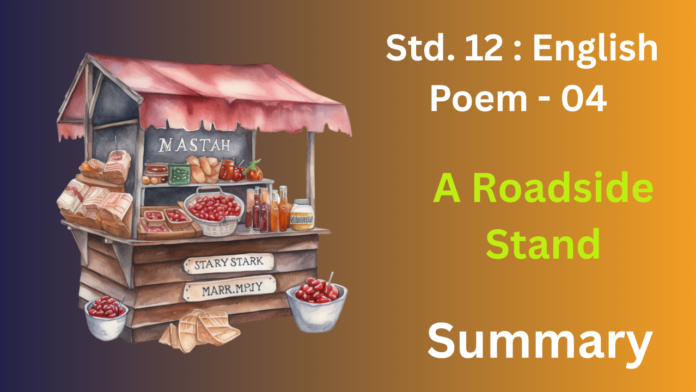Robert Frost’s “A Roadside Stand” depicts the plight of poor rural people who have set up a roadside stand hoping to earn some money from passing city dwellers. They yearn for the “city money” to improve their lives, believing the government and wealthy individuals will help them prosper, as promised. However, the city cars rarely stop, and when they do, it’s often to criticize the stand’s appearance, ask for directions, or try to get a better deal, showing a lack of genuine concern for the farmers’ well-being.
The poem expresses the speaker’s empathy for these hopeful yet disappointed people and their “child’s longing” for a better life. He criticizes the indifference and condescension of the city folk and the broken promises of those in power who seem to relocate and exploit the rural poor rather than truly helping them. The speaker grapples with the desire to end their suffering swiftly, a “ruthless kindness,” versus the hope that they might eventually receive the genuine support they deserve. Ultimately, the poem is a poignant commentary on the economic disparity between rural and urban life and the unfulfilled dreams of the rural poor.
Exercise
- Think it out
1. The city folk who drove through the countryside hardly paid any heed to the roadside stand or to the people who ran it. If at all they did, it was to complain. Which lines bring this out? What was their complaint about?
Ans:
The city people mostly ignored the roadside stand. If they noticed it, they were annoyed that its “artless paint” and wrongly directed signs spoiled the view. They cared more about the landscape’s appearance than the rural people’s needs.
2. What was the plea of the folk who had put up the roadside stand?
Ans:
The plea of the folk who had put up the roadside stand was a silent, desperate yearning for some of the “city money” to flow their way. They hoped that the passing cars, filled with wealthier city dwellers, would stop and purchase their goods – wild berries and squash – providing them with much-needed cash to improve their impoverished lives. Their plea was for economic sustenance and a share in the prosperity that seemed readily available to those in the cities, a chance to escape their poverty and fulfill their simple dreams. It was a longing for recognition and a fair exchange for their efforts.
3. The government and other social service agencies appear to help the poor rural people, but actually do them no good. Pick out the words and phrases that the poet uses to show their double standards.
Ans:
Robert Frost uses biting language to expose the hypocrisy of government and social agencies supposedly aiding the rural poor. He labels them “greedy good-doers,” an oxymoron highlighting their selfish motives masked by benevolent appearances. Even more damning is the phrase “beneficent beasts of prey,” a shocking comparison to predators disguised as helpers, revealing their exploitative nature. The poet describes them as “swarming over their lives enforcing benefits / That are calculated to soothe them out of their wits,” depicting an unwelcome intrusion with “help” that disorients and harms rather than genuinely supports. The condescending line “teaching them how to sleep they eat and where to sleep” illustrates a patronizing control that strips the villagers of autonomy. Ultimately, the aim of this “assistance” is revealed as a materialistic agenda: “teach them that the aim of life is money, money,” suggesting an imposition of capitalist values that may undermine their traditional way of life. Through these carefully chosen words, Frost critiques the superficial and ultimately detrimental nature of this so-called aid, starkly contrasting stated intentions with actual impact.
4. What is the ‘childish longing’ that the poet refers to? Why is it ‘vain’?
Ans:
The ‘childish longing’ that the poet refers to is the innocent and naive hope of the rural people who run the roadside stand that the wealthy city dwellers driving by will stop and buy their wares, thus providing them with much-needed income to improve their lives.
This longing is considered ‘vain’ because it is largely unfulfilled. The city folk are either indifferent to the stand and its keepers, speeding past without a second glance, or they stop only to complain about superficial things like the paint or ask for something the stand doesn’t offer (like gas). Their concerns are far removed from the economic desperation of the rural poor. Despite the farmers’ hopeful waiting and the “open window there, / That waits all day in almost open prayer,” their desire for genuine connection and financial support from the city dwellers rarely materializes, rendering their longing largely futile and disappointing.
5. Which lines tell us about the insufferable pain that the poet feels at the thought of the plight of the rural poor?
Ans:
The poet’s deep suffering over the rural poor’s situation is evident in the lines:
These words explicitly show his emotional distress at seeing their innocent hopes repeatedly go unfulfilled. The phrase “hardly bear” underscores the intensity of his pain regarding their disappointed yearning for a better existence.
Talk about it
Discuss in small groups.
The economic well-being of a country depends on a balanced development of the villages and the cities.
Ans:
A country’s economic health is intrinsically linked to the balanced progress of both its rural and urban areas. Villages often serve as the primary producers of food and raw materials, fueling urban industries and sustaining the population. Conversely, cities act as centers for manufacturing, commerce, technology, and services, providing markets for rural produce and opportunities for economic diversification and growth. Neglecting either sector creates imbalances: struggling villages can lead to food insecurity, migration, and a lack of resources for urban industries, while underdeveloped cities can hinder innovation, limit market access for rural goods, and fail to absorb the rural workforce effectively. Therefore, equitable investment and development in both rural and urban areas are crucial for a stable, prosperous, and sustainable national economy, ensuring that all segments of the population contribute to and benefit from economic progress.
Try this out
You could stop at a dhaba or a roadside eatery on the outskirts of your town or city to see
1. how many travellers stop there to eat?
Ans:
The poem doesn’t specify how many travelers stop to eat at the roadside stand. Instead, it emphasizes how few people stop and the disappointing nature of those interactions. The focus is on the rural people’s unfulfilled longing for customers and the city dwellers’ indifference or complaints.
2. how many travellers stop for other reasons?
Ans:
The poem mentions a few reasons why travelers stopped, other than to eat:
- One car stopped to inquire what a farmer’s prices were.
- Another stopped to ask the way to where it was bound.
- One even stopped only to plow up grass in using the yard to back and turn around.
So, a few travelers stopped for inquiries or to maneuver their vehicles, but not to support the stand economically.
3. how the shopkeepers are treated?
Ans:
The shopkeepers at the roadside stand are largely treated with indifference or even disdain by the passing city dwellers. Most cars speed by without stopping, completely ignoring their presence and their offerings. When city folk do stop, it’s rarely out of genuine interest in buying their goods. Instead, they often inquire about prices in a way that suggests they are looking for a bargain or even criticizing the cost. Some stop merely to ask for directions, treating the stand as a convenient landmark without contributing to its income. Worst of all, one traveler carelessly damages the yard while turning their car around, showing a complete lack of respect for the property and the efforts of the shopkeepers. Overall, the treatment highlights a significant disconnect and a lack of empathy from the wealthier city people towards the struggling rural vendors.
4. the kind of business the shopkeepers do.
Ans:
The shopkeepers at the roadside stand engage in a very small-scale, localized business. They sell simple, homegrown or locally sourced items to the passing traffic. The poem specifically mentions:
- Wild berries in wooden pints.
- Crooked-necked golden squash with silver warts.
This suggests they are selling agricultural produce, likely harvested from their own land or nearby areas. Their business is directly dependent on the willingness of travelers to stop and purchase these items, and it appears to be a struggle for them to earn a significant income.
5. the kind of life they lead.
Ans:
The individuals running the roadside stand experience a life defined by limited resources, diligent labor, and unrealized ambitions. Residing in a “little old house” with a newly erected “little new shed” beside the road reveals their humble circumstances. Their income relies on the small earnings they aspire to make by selling their goods to travelers. Their “childish longing” for “city money” to better their lives indicates their financial difficulties and desire for an improved living standard. They maintain a hopeful vigil for customers but frequently encounter apathy or negative feedback, underscoring their precarious situation and reliance on the kindness of strangers. Their daily existence seems to be one of subdued despair, evident in the gap between their aspirations for prosperity and the stark realities of their constrained lives in rural isolation.


